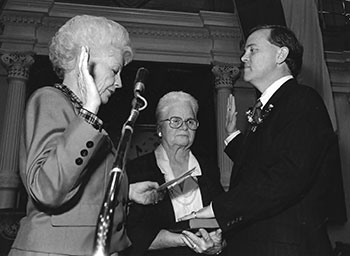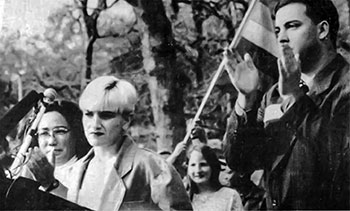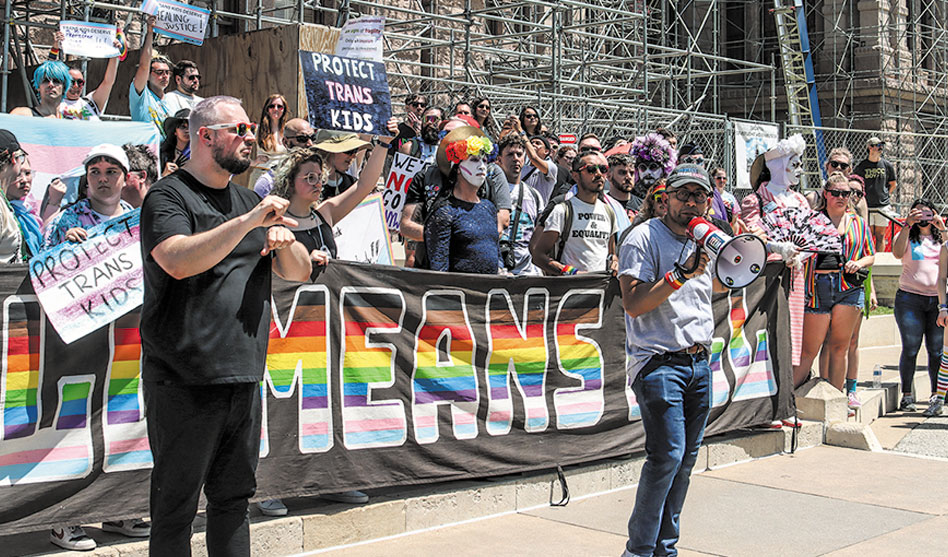Equality Texas CEO Ricardo Martinez, with megaphone, addresses the crowd at the April 2023 Queer March on the Capitol.
(Photo by Tammye Nash)
Marsha Dimes, Dallas Voice will receive awards at the regional Love Equality gala
DAVID TAFFET | Senior Staff Writer
taffet@dallasvoice.com
Equality Texas will present Marsha Dimes with the 2024 Legacy Award and Dallas Voice with the Equality Texas 2024 Business Leadership Award at the Love Equality event set for May 4 at the Dallas Contemporary Museum.
Equality Texas supporters in each major Texas city work year-round to raise funds for the statewide advocacy organization, helping to maintain its Austin offices and fulltime staff. Love Equality is the Dallas Steering Committee’s primary fundraising effort each year.
In addition to lobbying members of the Legislature, Equality Texas educates both members of the LGBTQ community and the general public on issues affecting the community and encourages members of the LGBTQ community to engage with their elected officials.

Rep. Glen Maxey is sworn in by Gov. Ann Richards (Photo courtesy Alan Pogue, Texas Center for Documentary Photography)
The award winners at this year’s reception compliment the work of Equality Texas.
The Legacy Award recognizes those who have demonstrated “extraordinary leadership, resilience and commitment in advocating for the rights and well-being of LGBTQIA+ individuals across the Lone Star State.” Marsha Dimes will be honored for her “unwavering dedication and outstanding contributions towards significantly advancing the cause of equality and justice for LGBTQIA+ communities in North Texas.”
The Business Leadership Award “recognizes … steadfast commitment to fostering environments where all individuals are valued, respected and empowered regardless of their gender identity, sexual orientation, race, ethnicity, religion or background.” Dallas Steering Committee members, in a press release announcing the awards, said, “Dallas Voice exemplifies exceptional leadership in promoting diversity, inclusion and equality within the workplace and the broader community in North Texas.”
Love Equality takes place at the Dallas Contemporary in the Design District, which partners with Dallas Hope Charities that focuses on homeless LGBTQ youth. Tickets are $100 and can be purchased online at EqualityTexas.org.
Event organizers wrote, “Your attendance at this event will help fund the vital advocacy necessary to hold the line yet again. And, between gourmet food and stunning entertainment, it is bound to be a night we won’t soon forget.”
A week after the Equality Texas award is given, Dallas Voice will be celebrating its 40th anniversary with a party of its own at the Round-Up Saloon, 3912 Cedar Springs Road, on May 11 from 6-9 p.m. That party is free to attend.
A brief history
Equality Texas’ roots go back to 1979 when members of the Lesbian/Gay Democrats of Texas and the Texas Gay Task Force hired a lobbyist to monitor the 67th Texas Legislature and lobby on behalf of lesbian and gay interests, according to the Equality Texas website. Those same two groups, in January 1982, created the Lesbian/Gay Rights Advocates, and in 1986 LGRA morphed into the Lesbian/Gay Rights Lobby of Texas. Then in 1987, Glen Maxey, chief legislative aide for state Sen. Oscar Mauzy, was hired as LGRL’s first executive director.
In 1990, the the Allan G. Calkin Human Rights Education and Research Fund was established to operate as LGRL’s charitable arm.
Maxey stepped down from his position with LGRL in 1991 to run for the Texas House seat left vacant when Gov. Ann Richards appointed Lena Guerrero to the Texas Railroad Commission. His victory in November that year made him the first openly LGBTQ person elected to the statehouse. His election also gave LGRL a level of credibility despite the hostile environment.
At the time, the Legislature was under Democratic control, but the understanding of AIDS was dismal. Rather than passing any legislation that might have helped during the AIDS crisis, laws were proposed to quarantine gay men in the state. Thankfully those laws never passed.
Laurie Eiserloh — now a district court judge in Travis County — succeeded Maxey as executive director. Then in 1993, Dianne Hardy Garcia Eiserloh took over as executive director, leading the organization for about nine years, through the turbulent 1990s until 2002.

Dianne Hardy Garcia, left, with Laurel Taber and Wesley Beard at a January 1994 rally in Tyler’s Bergfield Park following the murder of Nicholas West. (Photo by Tammye Nash, via the Dallas Voice archives)
Shortly after Hardy Garcia became head of LGRL, a young gay man, Nicholas West, was found shot to death in a gravel pit in Noonday, just outside of Tyler, Texas.
With his murder as the impetus, Hardy Garcia spent much of her time throughout her tenure focused on getting a comprehensive hate crimes bill enacted in this state. She was relentless in her efforts, becoming a fixture in the Capitol. She didn’t concede a single vote and legislators got so tired of seeing her, they’d pivot rather than have her confront them.
But her tenacity paid off and in 1999, a hate crime bill passed both houses of the Texas Legislature. Unfortunately, then-Gov. George Bush was running for president and vetoed the legislation rather than risking angering his anti-LGBTQ base.
But Hardy Garcia and other activists persisted, and — spurred on now by outrage over the horrific June 1998 hate crime murder of Black man James Byrd Jr. in Jasper, Texas, followed that October by the hate crime murder of gay college student Matthew Shephard in Wyoming — the Texas Legislature passed the James Byrd Jr. Hate Crimes Law and then-Gov. Rick Perry, at the urging of Republican lawmakers, signed it into law.
Hardy Garcia and other advocates have credited Byrd’s family with making sure that the law carrying his name includes protections based on “race, religion, color, sex, disability, sexual preference, age, or national origin.” The Texas law still does not include protections based on gender identity, leaving such inclusion a battle Equality Texas continues to fight.
In 2006, LGRL changed its name to Equality Texas to reflect its broader mission as more than just a lobbying organization that now works to achieve equality for everyone in the LGBTQ community. The new name is also consistent with other, more recently created equality organizations across the country like Equality Florida and Equality Oklahoma.
Since the passage of the state hate crimes law, fighting off bad legislation — especially bills targeting the transgender community — has become Equality Texas’ main focus. And each recent session since has seen a record number of anti-LGBTQ bills filed.
While Hardy Garcia worked with out state Rep. Maxey and a small group of allies in the Texas Legislature, current Equality Texas CEO Ricardo Martinez has a paid staff, a network of supporters around the state and the Legislative LGBTQ Caucus to support his work.
Together, they have killed the vast majority of the anti-LGBTQ legislation introduced by anti-equality forces in each legislative session. Some of the organization’s victories include defeating efforts to prevent gays and lesbians from serving as foster and adoptive parents; defeating bills that would have prevented the recognition of out-of-state same-sex marriages and civil unions in 1997, 1999 and 2001; increasing AIDS and HIV funding; facilitating the passage of the Omnibus AIDS bill; pressing for adoption of HIV grant programs and HIV services funding; getting openly gay and lesbian people appointed to state commissions; getting nondiscrimination policies protecting lesbian and gay employees adopted in five major state agencies and much more.
With the help of funding from events like Love Equality, Equality Texas continues its work fighting off a rising tide of discriminatory legislation. Although the Texas Legislature doesn’t meet this year, Equality Texas is already preparing for the 2025 session by studying anti-LGBTQ bills being filed in legislatures around the country. A new record level of bills targeting transgender youth and their families that support them, attacking same-sex marriage and more are expected to be filed.

